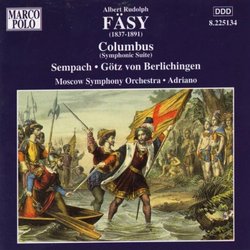Hardly worth the effort
G.D. | Norway | 01/31/2010
(2 out of 5 stars)
"Albert Rudolph Fäsy (1837-1891) is a curious figure in the sense that, apart from these dates and the fact that he was admitted to the Leipzig Conservatory in 1856, nothing is known about his life. The booklet speculates that he must have known Wagner personally (although the latter composer never mentions him), since a copy of Tannhäuser with the composer's own corrections was found in Fäsy's library. And Fäsy's music, of which the items on this disc probably constitute his complete orchestral output (they were probably written between 1870 and 1890), is certainly inspired by Wagner.
But the music is not exactly derivative - in fact, if you think originality is unconditionally a virtue, then Fäsy is your man. My problem with the music is that the originality seems to stem not from creativity and resourcefulness, but simply from a lack of technical skills and knowledge - when Beethoven exploded compositional rules, he knew exactly what he was doing, and he did so because the end results benefited from it. And that does emphatically not seem to be the case here. The remarkable premonitions of late twentieth century minimalism, for example, does not seem to be an effect conscious choice, but rather from a severe lack of ability to develop the musical ideas and material properly.
In any case, the prelude to Götz von Berlichingen does resemble Wagner's Meistersinger prelude, interestingly matching the latter in orchestration (one suspects that Fäsy was studying the score intensively), but lacking the distinction or the strength of Wagner's melodic material. In The Triumph of Love, the Wagner influence is equally impossible to miss (coming close to plagiarism at times), and again the music lacks all the ingenuity of Wagner's - it is a bloated, desperately boring and banal piece with few or no redeeming features. Sempach is equally garish and overblown, with totally uninteresting melodic ideas, boldly flagged onwards for what seems like an eternity. The Columbus suite is the only work here that comes close to sustaining the listener's interest. It is based on a seven-note figure which is developed with some cleverness (the minimalist premonitions); still, if you miss the opportunity to hear it you aren't missing out on anything really interesting.
The performances are rough but serviceable, I guess, and Adriano sounds like a committed champion (despite the fact that he's recorded a lot of less interesting music I remain grateful for his commitment to exploration and discovery). The recording is bad, though; constricted and hard-edged, making the brass sound overly pugnacious and sometimes downright ugly. The strings sound thin and hard and are recorded almost without any space or reverberation at all. Overall, then, I won't recommend this issue to anyone but the most ardent enthusiasts for the unknown."


 Track Listings (9) - Disc #1
Track Listings (9) - Disc #1